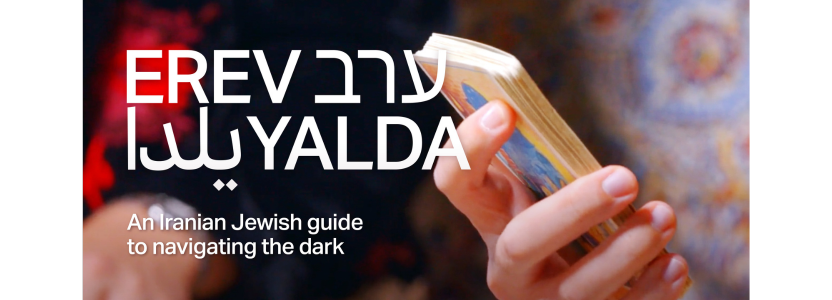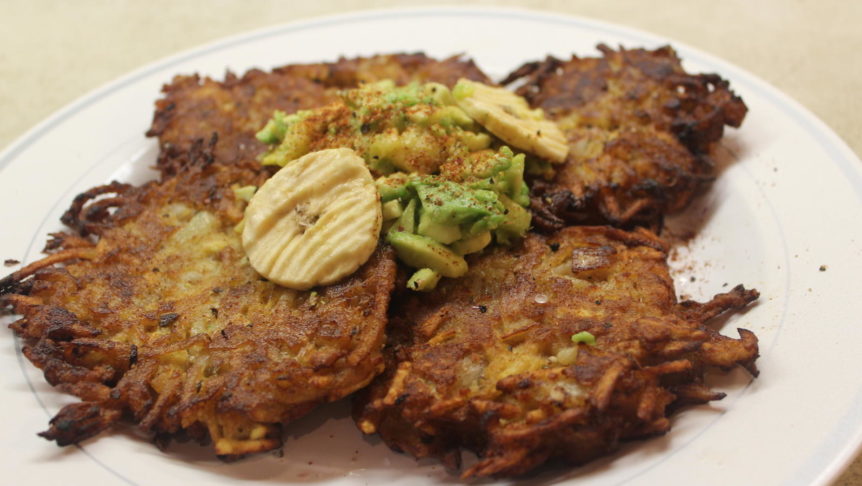“As the winter holidays approach, Reboot Studios presents a new way to celebrate with Erev Yalda, a reimagining of the ancient Persian winter solstice celebration, Yalda. The new ritual blends Yalda with the themes of Hanukkah, through an Iranian-Jewish lens. Conceived by Los Angeles-based entrepreneur Rachel Sumekh and food writer Tannaz Sassooni, Erev Yalda brings a vibrant, new tradition to life—one that inspires people from all backgrounds to embrace warmth, light, and resilience during the year’s longest night.” – Reboot
Be’chol Lashon spoke with Erev Yalda’s creators, Rachel Sumekh and Tannaz Sassooni, who illuminate the added joy and meaning that is possible when blending global traditions like Shab-e Yalda with Jewish holidays like Hanukkah.
BL: After watching Erev Yalda, it can be hard to believe that Shab-e Yalda and Hanukkah haven’t always been blended traditions! Can you tell us more about where the initial idea and inspiration came from to create this project?
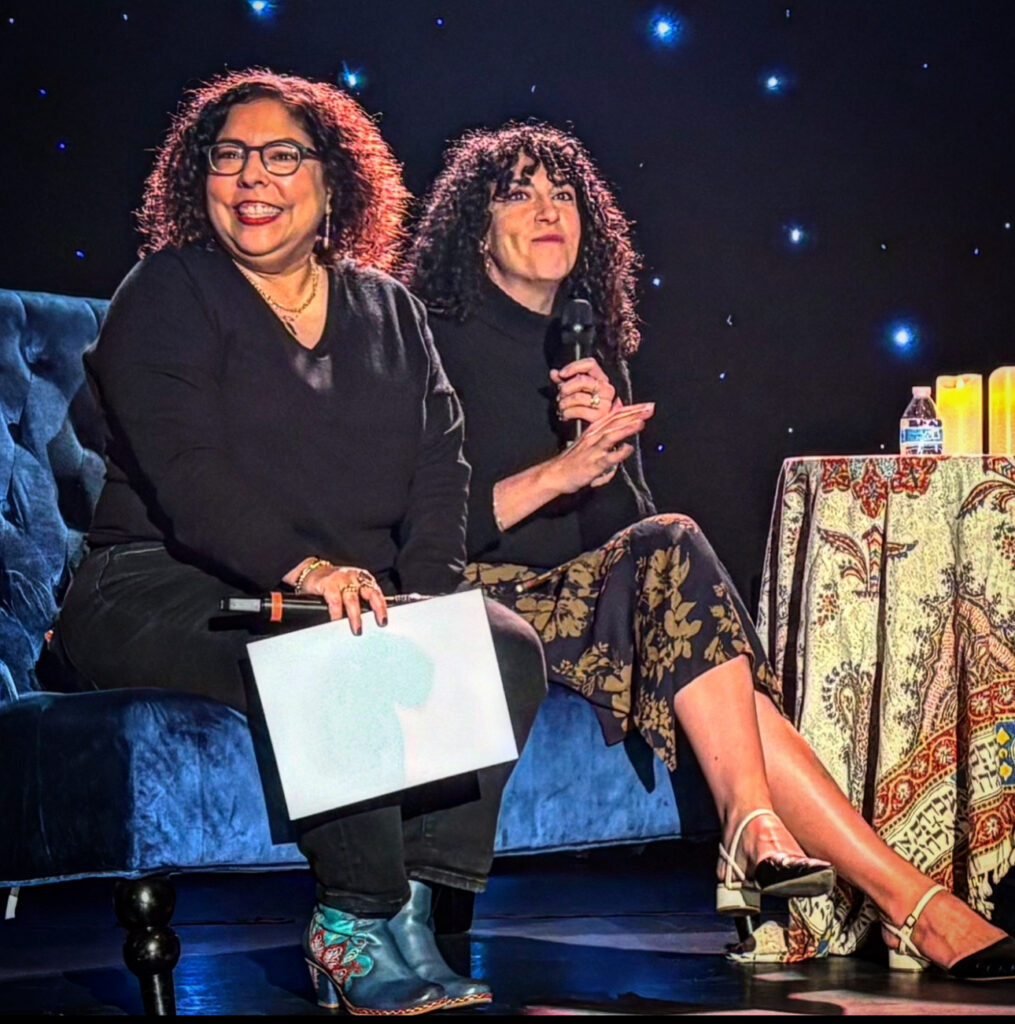
Tannaz and Rachel at the launch of “Erev Yalda”
Rachel: Right? For many years I celebrated them separately. When Tannaz approached me about collaborating on a project a few months ago, it wasn’t even a minute in before I named just how much the two holidays shared. I thought back to Shab-e Yalda in 2022 where we literally also lit Hanukkah candles as it was the third night. The two have been twin flames whose shared spirit we finally brought together.

BL: Rachel, at the end of the film your dad tells us how he is moved by Erev Yalda. What does it mean for you, personally, to create a new ritual that brings these two cultures together?
“This new tradition of Erev Yalda that you are creating, that brings the two traditions together, is such a wonderful thing. We’re creative people, and you’re not just reliving the way the older generations did it. But you bring your aspirations for what can be in bringing these things together.” – Joseph Sumekh
Rachel: Every diaspora kid questions if they are doing right by their grandma. Will my kids speak the language, am I doing enough of the traditions…I felt the concerns about doing it “right” drift away as we researched and built the project behind Erev Yalda. In the end, it made clear for me that alongside speaking, and reading and cooking in Persian, what mattered most is that we do not leave our culture and practices to become antiquated but adapt them into existing into the future, ensuring ongoing relevance.
BL: From fried foods that incorporate Iranian ingredients, to introducing us to a lesser known piece of Talmud, you’ve found such thoughtful ways of blending elements of Yalda and Hanukkah. Can you tell us more about your process of creating Erev Yalda? Were there any unexpected highlights or challenges that arose for you in bringing the new tradition of Erev Yalda to life?
Tannaz: We started with Rachel’s Yalda celebrations, but we wanted to ensure that the Jewish angle was represented, so it became an R&D process for connections – across food, Jewish writing, and traditions around light. It’s a mission of mine to bring Iranian food stories into the Jewish mainstream, so I’m always looking for culinary overlaps. Once we decided on latke tahdig, it all came together – dill is a common flavor in Ashkenazi cuisine, but paired with fava beans and saffron, it’s very Persian. And mast-o-moosir, thick creamy yogurt with Persian shallots, is a common companion to Persian rice and a perfect stand-in for sour cream. It took a few iterations to get latke tahdig just right, but it’s not so bad when you can eat your mistakes.
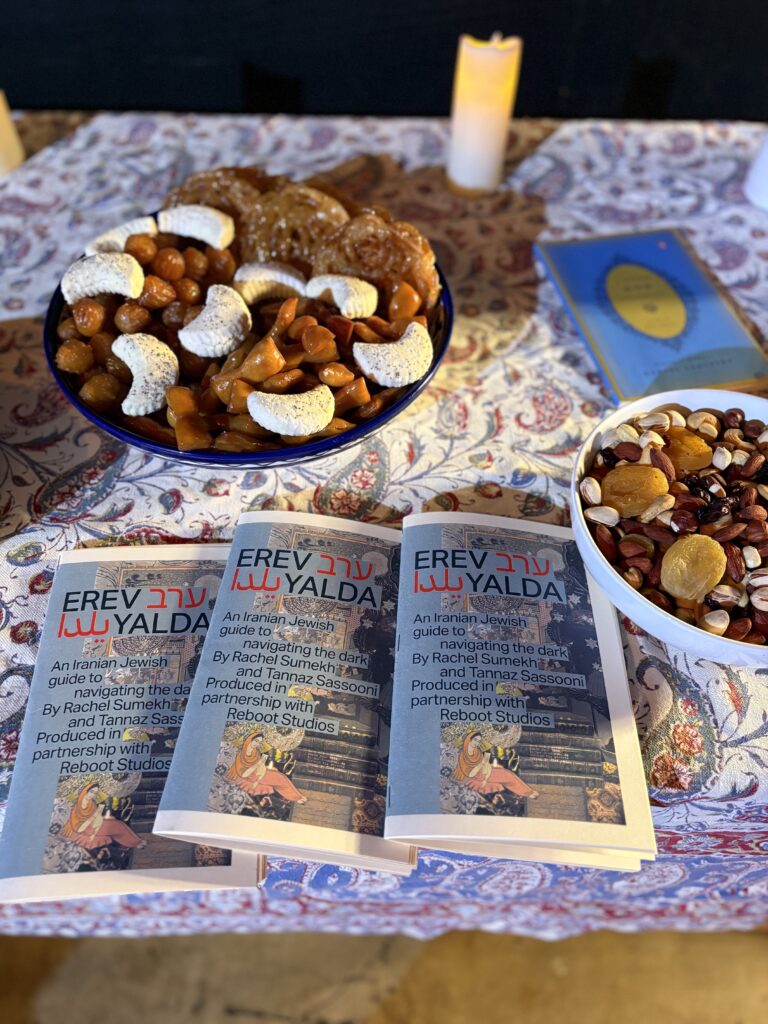
A spread of Yalda and Hanukkah blended foods next to the poetry of Hafez at the launch of Erev Yalda
BL: The recipes you developed for Erev Yalda were creative and beautiful! Do you have a favorite Hanukkah or Shabe Yalda food memory?
Tannaz: Iran doesn’t have a strong Hanukkah food tradition, but I “decided” some years ago that zoulbia should be our contribution – as I mention in the film, they just fit so well into the Sephardic fritter landscape. So now I make my mom’s zoulbia recipe whenever I go to Hanukkah parties, and friends love them! Of course, our family Hanukkahs add another mashup born of our diaspora life in Los Angeles: we have a celiac in the family, so gluten free churros from my local taquería are always on our table!
BL: The reading of Hafez’s poetry felt like an especially meaningful moment of connection and vulnerability for guests in Erev Yalda. Since the reading of the poetry during Shabe Yalda is something you’ve done every year, do you have a favorite memory during one of these readings? Or a favorite poem that you encountered?
Rachel: I loved the moment in the film when Michaela Watkins asked “why are all of these random bad things happening to me?” And the poem she randomly opened up to was called “Of Course Things Like That Happen.” It was so surreal! But those are my favorite moments, when guests who have never been to a Yalda realize just how wise and magical Hafez’s poems are.
Tannaz: The poem that my parents read in the film, they picked at random from my dad’s Hafez card deck. We only have the first verse in the film, but as my mom read the whole thing, she discovered that my sister’s name, Torreh – a rare poetic word for a lock of hair – was also in the poem she picked! It brought her to tears. These strange coincidences happen over and over with Hafez’s poems! It really is uncanny.
BL: This video is a fantastic introduction to the holiday of Shabe Yalda for those who may have never celebrated it before or don’t have personal ties to Persian Jewish culture. Do you have any suggestions people should keep in mind for how they can authentically and responsibly celebrate Shabe Yalda without falling into unintentional cultural appropriation?
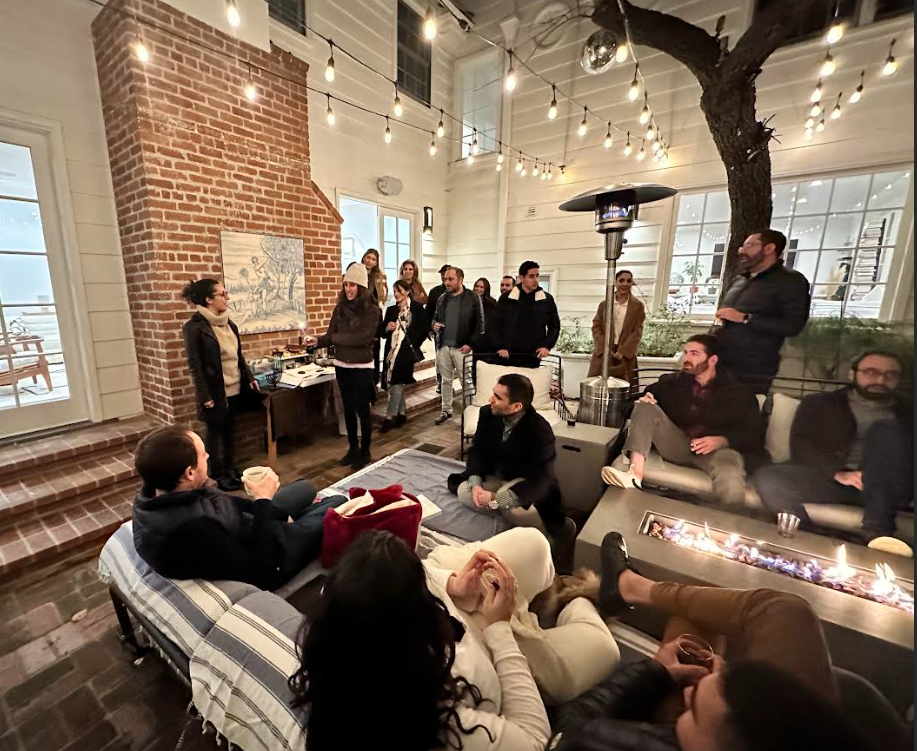
Rachel’s 2022 Yalda celebration that fell on Hanukkah
Rachel: This is such a thoughtful question. We ask that if anything we suggest in the video or guide feels too unfamiliar or difficult, to scale it down. If getting through a dozen poems is too much, just tell your guests at Hanukkah you’ll only be reading one or two. We invite you to scale the rituals to what feels most comfortable while embracing the spirit of the two holidays– bringing in light!
Tannaz: I’ll add that Erev Yalda, as a new tradition, is an opportunity for play – we’ve created something new with what was handed down to us, and we encourage others to bring their own traditions into it. The key to avoid appropriation, in my eyes, is marking the distinction between what’s traditional and what’s your novel take. Come in with benevolence and humility and you can’t go wrong.
BL: What are your hopes for the Erev Yalda project? Are you planning to create more videos or resources related to Shabe Yalda or other Persian and/or Jewish traditions?
Rachel: This is our first year and we’ve been overwhelmed by just how much the holiday is resonating across people of so many backgrounds. Our focus is hosting and attending as many Shab-e Yalda and Hanukkah gatherings as possible where these traditions and lessons will be fused side by side. We invite anyone reading to check out the guide and join us! Next year, we hope to build and share from what evolves from our community’s gatherings this year. Next year Yalda falls exactly on the 6th night of Hanukkah!
BL: Is there anything else you wish the wider Jewish community knew about Persian Jews and/or their traditions?
Tannaz: There is so much richness to Iranian Jewish culture that many western Jews have no idea about. The Babylonian Talmud was written in the Persian Empire – we are foundational to the Judaism practiced today! There’s of course a seasonal and often regional culinary culture laden with spices, heady aromatics like rose water and cardamom, mountains of fragrant basmati rice, and jewel-like dried fruits. There are countless Judeo-Persian languages, ancient epic poets whose works braided into the traditions of their Sufi compatriots. While the underlying values are shared across Jewish communities, I so wish there were a bigger spotlight on the robust and beautiful practices that are uniquely Iranian Jewish.
Experience your own Erev Yalda celebration through Rachel and Tannaz’s short film and the accompanying resource guide.



